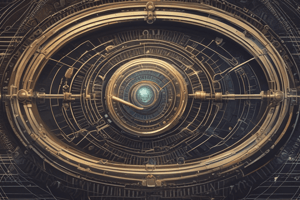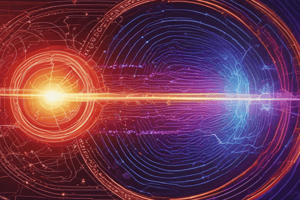Podcast
Questions and Answers
The flow of ______ through a conductor is known as electric current.
The flow of ______ through a conductor is known as electric current.
electrons
Electrons can occupy any energy level within an atom.
Electrons can occupy any energy level within an atom.
False (B)
Match the following terms with their corresponding descriptions:
Match the following terms with their corresponding descriptions:
Electric current = The rate of flow of electric charge Resistance = Opposition to the flow of current Conductivity = The ease with which electrons can flow through a material Voltage = The driving force that pushes current through a circuit
What is Coulomb's Law used to calculate?
What is Coulomb's Law used to calculate?
Which of these is NOT a fundamental property of matter?
Which of these is NOT a fundamental property of matter?
The difference in potential energy between two points is called ______.
The difference in potential energy between two points is called ______.
Opposite charges attract each other.
Opposite charges attract each other.
What is the relationship between voltage, current, and resistance in a circuit described by?
What is the relationship between voltage, current, and resistance in a circuit described by?
What is the primary function of a capacitor in a circuit?
What is the primary function of a capacitor in a circuit?
A changing magnetic field is necessary for electromagnetic induction to occur.
A changing magnetic field is necessary for electromagnetic induction to occur.
What are two key components required for electromagnetic induction?
What are two key components required for electromagnetic induction?
Electricity powers the intricate circuitry of ______, smartphones, and countless other devices.
Electricity powers the intricate circuitry of ______, smartphones, and countless other devices.
Match the following applications of electricity with their corresponding areas:
Match the following applications of electricity with their corresponding areas:
Which of the following is NOT a key application of electromagnetic induction?
Which of the following is NOT a key application of electromagnetic induction?
Nanotechnology involves exploring the use of electricity at the atomic level for advanced materials and devices.
Nanotechnology involves exploring the use of electricity at the atomic level for advanced materials and devices.
Describe one potential benefit of using electricity at the nanoscale in technology.
Describe one potential benefit of using electricity at the nanoscale in technology.
Flashcards
Electricity
Electricity
The flow of electrons that powers everything.
Atoms
Atoms
The building blocks of matter containing protons, neutrons, and electrons.
Electrons' Role
Electrons' Role
Electrons are responsible for chemical bonds and electrical conductivity.
Energy Levels
Energy Levels
Signup and view all the flashcards
Coulomb's Law
Coulomb's Law
Signup and view all the flashcards
Electric Field
Electric Field
Signup and view all the flashcards
Electric Current
Electric Current
Signup and view all the flashcards
Ohm's Law
Ohm's Law
Signup and view all the flashcards
Capacitance
Capacitance
Signup and view all the flashcards
Capacitor Construction
Capacitor Construction
Signup and view all the flashcards
Charge Storage
Charge Storage
Signup and view all the flashcards
Electromagnetic Induction
Electromagnetic Induction
Signup and view all the flashcards
Induced Current
Induced Current
Signup and view all the flashcards
Applications of Electromagnetic Induction
Applications of Electromagnetic Induction
Signup and view all the flashcards
Electricity in Transportation
Electricity in Transportation
Signup and view all the flashcards
Future of Electricity
Future of Electricity
Signup and view all the flashcards
Study Notes
Electricity
- Electricity is a fundamental force of nature
- It's the flow of electrons
- Electrons are tiny particles with a negative charge
- Electrons power our world
Atomic Structure and Electrons
- Atoms are the building blocks of matter
- Electrons orbit the nucleus
- Nucleus contains protons and neutrons
- Electrons are responsible for chemical bonds and electrical conductivity
- Electron configuration in an atom determines its properties
- Electrons occupy specific energy levels
- Electrons exhibit wave-particle duality, explained by quantum mechanics
Electrical Charge and Coulomb's Law
- Electric charge is a fundamental property of matter
- It exists as positive or negative
- Like charges repel each other
- Opposite charges attract each other
- Coulomb's Law quantifies the force between two charged objects
Electric Fields and Potential Energy
- An electric field surrounds any charged object
- It exerts a force on other charges
- A charge within an electric field possesses potential energy
- Work is done when a charge moves against an electric force
- The difference in potential energy between two points is called voltage
Electric Current and Resistance
- Electric current is the flow of electric charge (typically electrons) in a conductor
- Electric current (I) is the rate of flow of charge
- Resistance (R) is the opposition to the flow of current
- Conductivity is the ease with which electrons can flow through a material
Ohm's Law and Electrical Circuits
- Ohm's Law describes the relationship between current, voltage, and resistance in a circuit
- Voltage is the driving force that pushes current through a circuit
- Current is the flow of electric charge through a circuit
- Resistance opposes the flow of current in a circuit
Capacitance and Capacitors
- Capacitance is a measure of a capacitor's ability to store electric charge
- A capacitor has two conductive plates separated by an insulating material
- Capacitors store electrical energy by accumulating charge on their plates
- Capacitors are used in various circuits for filtering, smoothing, and energy storage
Electromagnetic Induction and Faraday's Law
- Electromagnetic induction occurs when a changing magnetic field induces an electric current in a conductor
- A changing magnetic field is essential for induction
- A conductor is required to carry the induced current
- The changing magnetic field induces an electric current
- Induction is used in generators, transformers, and other technologies
Applications of Electricity in Technology
- Electricity powers countless technologies that shape our modern world
- It is used in computers and electronics
- It is used in transportation (electric cars and trains)
- It is used in energy production (renewable energy)
Conclusion and Future Developments
- Our understanding of electricity continues to evolve
- Nanotechnology is exploring the use of electricity at the nanoscale for advanced materials and devices
- Quantum computing is developing new computational models based on quantum mechanics
- Renewable energy is improving efficiency and accessibility of sources powered by electricity
Studying That Suits You
Use AI to generate personalized quizzes and flashcards to suit your learning preferences.




